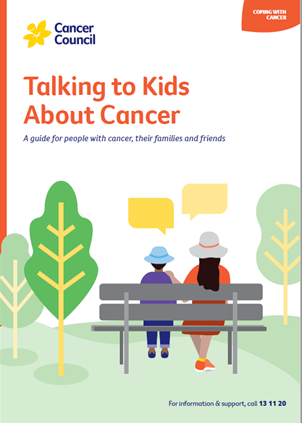- Home
- About Cancer
- Family and friends
- Talking to kids about cancer
- Talking about treatment
- Family life during treatment
- Maintaining discipline
Maintaining discipline
It can be hard enough to maintain family rules when you’re fit and healthy, let alone when you’re dealing with the emotional and physical effects of cancer treatment or caring for someone with cancer. Some parents say they feel guilty for putting the family through the stress of cancer, so they don’t want to keep pushing their children to do homework and chores.
| The role of discipline in challenging times | The issue of discipline is a common concern for families dealing with cancer. Maintaining the family’s usual boundaries and discipline during this time can strengthen your children’s sense of security and their ability to cope. |
| Consistency in routines and expectations | Keeping up children’s chores, encouraging good study habits, calling out inappropriate behaviours, and sticking to regular bedtimes – all require continued and ongoing supervision from adults. |
| Understanding behavioural changes in children | Some children may misbehave or push the boundaries to get the attention they feel they are missing. |
| Balancing flexibility and structure | Although some flexibility may be reasonable at this time, a predictable set of boundaries and expectations can help to maintain a sense of normal life and will be reassuring for children and young people. Let teenagers know that the usual rules apply for curfews, drug and alcohol use, and sex. |
→ READ MORE: Encouraging children to help
Podcast: Family Dynamics and Cancer
Listen to more episodes from our podcast for people affected by cancer
More resources
Prof Jane Turner AM, International Psycho-Oncology Society President Emeritus,The University of Queensland, QLD; Taylor Baker, Consumer; Dr Ben Britton, Principal Clinical and Health Psychologist, Head of Psychology, Hunter New England Mental Health, NSW; Camp Quality; Dr Lisa Cuddeford, Head of Department, WA Paediatric Palliative Care Service, Perth Children’s Hospital, WA; A/Prof Peter Downie, Head, Paediatric Haematology–Oncology and Director, Children’s Cancer Centre, Monash Children’s Hospital, VIC; Dr Sarah Ellis, Clinical Psychologist, Kids Cancer Centre, Sydney Children’s Hospital, NSW; Malia Emberson-Lafoa’i, Consumer; Kate Fernandez, 13 11 20 Consultant, Cancer Council SA; Jane Gillard, Consumer; Mary McGowan OAM, International Childhood Cancer Advocate, VIC; Annette Polizois, Senior Social Worker, Women, Family and Emergency Care Team, Royal North Shore Hospital, NSW; Rhondda Rytmeister, Clinical Psychologist, HeadWayHealth (formerly Snr Clinical Psychologist, The Cancer Centre for Children, Westmead, NSW); Nadine Street, Head of Social Work and Social Welfare, HNE Mental Health Service, NSW; Warren Summers, Online Counsellor, Canteen, NSW.
We would also like to thank the health professionals, consumers, organisations and editorial teams who have worked on previous editions of this title, and we are grateful to the parents and young people whose real-life stories have added to the richness and relevance of this book.
We thank and acknowledge Dr Paula K. Rauch, MD, Founder and Director, Marjorie E. Korff PACT (Parenting At a Challenging Time) Program and Associate Professor of Psychiatry, Harvard Medical School, whose research and writing on helping parents talk to their children about cancer was used as source material for this book and has been adapted in several sections: pages 8–11, How children understand cancer; page 22, Answering key questions: Are you going to die?; page 26, Involving the school or preschool; pages 30–31, Hospital visits; and pages 36–37, Encouraging family time. We also thank the American Cancer Society for permission to use and adapt material on pages 8-11 from its book Cancer in Our Family: Helping children cope with a parent’s illness (2013); Macmillan Cancer Support for permission to use its book Talking to Children and Teenagers When an Adult Has Cancer (2013) as a source of information; Jessica Watt, Oncology Social Worker, The Children’s Hospital at Westmead, for her contribution on page 20, When another child has cancer; and Diane McGeachy, Hobart Counselling Centre, for contributing material for page 37, Spending one-on-one time.
View the Cancer Council NSW editorial policy.
View all publications or call 13 11 20 for free printed copies.

